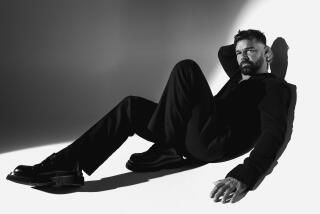Robert Palmer, 54; Stylish British Rock Singer’s Biggest Hit Was ‘Addicted to Love’
- Share via
Robert Palmer, the suave British rock singer who rose to stardom in the mid-1980s with his sexy rocker “Addicted to Love,” died of a heart attack Friday. He was 54.
Palmer died in his room in a luxury hotel in Paris, where he was taking a two-day break after a TV recording session in England, his manager said.
In a solo recording career that began in 1974, Palmer did not have his first Top 10 single as a solo artist until “Addicted to Love” a dozen years later. The driving and sensual song rose to No. 1 and earned Palmer a Grammy for best male rock vocal in 1986.
The notorious “Addicted to Love” video, featuring deadpan, miniskirted models dispassionately playing instruments behind the handsome Palmer, became one of MTV’s most frequently played music videos and sparked feminist protests.
“These women were put in after I finished filming, and I’ve had to live them down ever since,” Palmer said in a 1994 interview.
But black-clad bombshells showed up again in his music videos for “I Didn’t Mean to Turn You On” and “Simply Irresistible.” The latter song earned Palmer another Grammy for best male rock vocal performance in 1988.
Palmer, who also had a hit with “Bad Case of Lovin’ You (Doctor Doctor),” was known for his understated vocals and eclectic musical tastes.
His 1990 album “Don’t Explain” included R&B;, jazz, reggae and pre-’50s torch songs -- as well as a couple of rockers.
“You get the feeling he merely tolerates the rockers because their mass appeal allows him to sing what he really wants to sing -- the quirky, quaint, vintage pop songs he really loves,” wrote a reviewer for the Los Angeles Times.
The singer was known as a man who knew how to dress -- his sartorial role models as a performer were the immaculate Marvin Gaye and Otis Redding. Palmer’s GQ sense of style prompted Rolling Stone, which once dismissed him as “white soul for snobs,” to name him the best-dressed male artist in 1990.
But although Palmer’s good looks and dapper suits were a major attraction for his female fans at concerts, the attention paid to his looks was a source of irritation for him.
“It would get on my nerves,” he told The Times in 1986. “The media made it worse. They didn’t know much about my music, so they dealt with these other superficial things. But it’s not so much of a problem anymore. Now I have hit records they can talk about.”
The son of a British naval intelligence officer, Palmer was born Jan. 19, 1949, in Batley, England. When he was 3 months old, his family moved to Malta, where he developed his eclectic taste in music.
“My parents were part of a crowd that was attached to all the different navies stationed in Malta,” he said in the 1994 interview. “When they would have parties in each other’s houses, I would get taken along, and that’s where I heard all this great music. I didn’t distinguish particular styles; it was all music to me.”
Returning to England when he was 12, Palmer began taking guitar lessons and joined his first band at 15. He later briefly studied graphic design, but by 1968, the 19-year-old Palmer had become a professional musician as a member of the Alan Bown Band. The following year, he joined Dada, which changed its name to Vinegar Joe and released three albums in the early ‘70s.
Palmer, who went solo after the band broke up, was no fan of the rock lifestyle.
“I loved the music, but the excesses of rock ‘n’ roll never really appealed to me at all,” he said. “I couldn’t see the point of getting up in front of a lot of people when you weren’t in control of your wits.”
In an interview with Rolling Stone, Palmer said, “I’m not concerned that my stuff isn’t extreme. I don’t want to be heavy. I can’t think of another attitude to have toward an audience than a hopeful and a positive one. And if that includes such unfashionable things as sentimentality, well, I can afford it.”
After going solo in 1974, Palmer made a string of albums that were critically acclaimed but achieved only modest commercial success.
In 1984, he teamed with Duran Duran’s John Taylor and Andy Taylor and Chic’s Tony Thompson to form a hard rock band called Power Station, for which he sang lead. Despite the band’s success -- a million-selling album with three hit singles -- Palmer left Power Station to return to his solo career.
“Drive,” his 14th album, was released in May.
Palmer, who lived in Switzerland for the last 16 years, is survived by his longtime companion, Mary Ambrose; and two children, James and Jane.
More to Read
The biggest entertainment stories
Get our big stories about Hollywood, film, television, music, arts, culture and more right in your inbox as soon as they publish.
You may occasionally receive promotional content from the Los Angeles Times.









